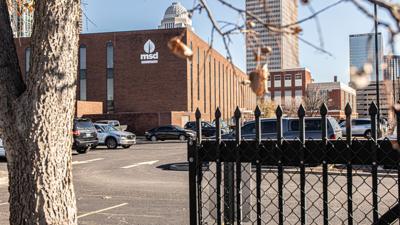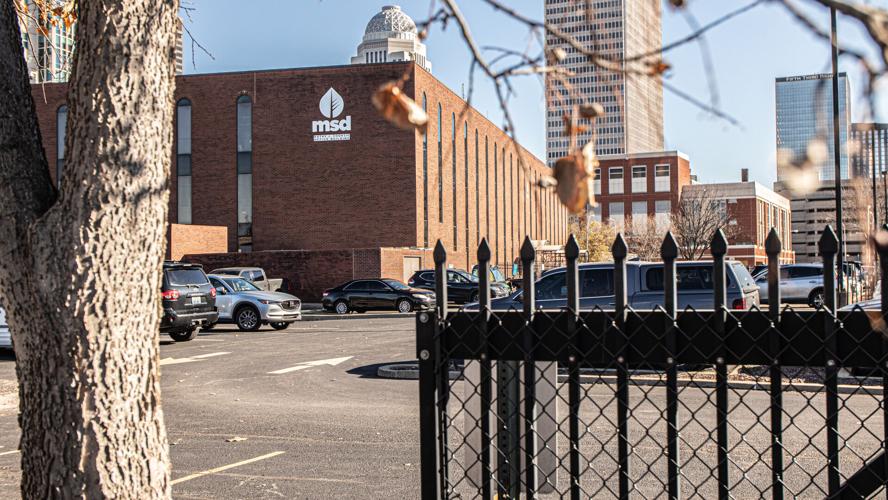LOUISVILLE, Ky. (WDRB) -- State and local officials held a news conference Thursday in Louisville calling for a comprehensive audit of the Metropolitan Sewer District, calling it a "debt-ridden runaway train."
Citing the years of rate increases, MSD argues it needs to replace outdated infrastructure and comply with a 2005 federal consent decree. Rep. Jared Bauman, R-Louisville, and Louisville Metro Councilman Scott Reed, R-16, decided a state audit is needed.
Bauman said he has constituents who've been on a fixed income since they retired 20 years ago, and their MSD bills have since increased by "probably over 400%."
"MSD is a debt-ridden runaway train that is driven by failed policies, questionable decision-making and a lack of accountability to customers and taxpayers," Bauman said. "It's constant punishing rate hikes are hurting all Louisvillians, but especially those on fixed incomes."
Reed acknowledged that costs have risen and said he's not sure what this audit will show. But he said he's looking for transparency, a new set of eyes looking at the agency.
"The people we deal with at MSD at the office level are great people. I'm not alleging anything," Reed said. "I'm just saying that it's time, in my opinion, to gain a full accountability so we can present that to the taxpaying public."
MSD again chose earlier this year to increase its rate by 6.9% — the largest increase it can self-impose without Metro Council approval — adding an average of $5.19 per month to Jefferson County residential bills. MSD Director Tony Parrott said the added revenue will help fund nearly $300 million in projects aimed at fixing the city's odor issues and repairing pipes that have been in place since the 1860s.
"We have a lot of work that has been pushed out, quite honestly, because we can only afford to do so much," Parrott said in May. "We have to do the projects. They are there to not only protect the city, but to make sure we're protecting the environment as well."
In response to Thursday's news conference, MSD said in a written statement that it has a "significant job with complex challenges," including the treatment of 170 million gallons of sewage a day and protecting $34 billion in residential and commercial property from rising floodwaters.
"Our rates are driven by the billions of dollars in system enhancements required by the federal government to eliminate sewer overflows that cause dangerous pollution in area waterways during periods of heavy rains," MSD said in its written statement. "That important work is mandated by the U.S. EPA and represents nearly 90 percent of our capital budget needs. While we never want to increase rates, measured increases over time are required in order to continue to protect the health and safety of our communities while continuing to meet our federal environmental requirements. Additionally, we continue to fund a range of rate assistance programs for low-income residents and senior citizens. MSD rates remain competitive with peer communities."
Aging Infrastructure
MSD agreed to a consent degree in 2005 with the U.S. Environmental Protection Agency in an effort to reduce sewer system overflows in Louisville. MSD said the overflows during periods of heavy rain were a byproduct of early design that combined wastewater and stormwater into the larger sewer system.
Those combined systems were common in Kentucky until 1955, when the state banned them, MSD said.
In the last 19 years, the consent decree has tied up most of MSD's spending in sewer and water quality improvements to get the city into compliance with the Clean Water Act. To meet the environmental requirements of the consent decree, Parrott said they have "to reduce sewer overflows that occur during periods of heavy rain, while still addressing the ongoing challenge of aging infrastructure and facilities that have reached the end of their functional lifespan."
The utility did complete one significant piece last year when it opened the 18-story, 4-mile Waterway Protection Tunnel. The project cost $221 million and can store up to 55 million gallons of storm and wastewater. That project, along with the four below, are projects completed as a part of the consent decree:
- 5.85 billion-gallon typical rainfall year reduction in CSO volume
- 72% elimination of projected two-year storm SSOs and 82% elimination for five-year storm projections
- 76% reduction in Ohio River fecal coliform concentration
- Nearly 18,000 plumbing modification projects to remedy residential basement backups
Reed said part of his reason for calling for an audit was to find the reason for the 10-year extension to the consent decree. But late last year, Parrott said MSD recently negotiated part of the federal agreement, extending it through 2035. The three projects below were added under that amended 2022 agreement:
- Morris Forman Water Quality Treatment Center: $198 million upgrade will replace an outdated biosolids processing system to increase capacity and decrease pollutants discharged to the Ohio River. Projected completion, 2030.
- Paddy's Run Pump Station: $124 million to replace this 59-year-old facility to better protect against Ohio River flooding and combined sewage discharges. Projected completion, 2026.
- Interceptor Rehabilitation: $70 million to replace critical large sewer lines (interceptors) that are up to 75 years old. Projected completion, 2025.
"We did build in some flexibility to be able to budget $25 million a year to address what we call asset management or to address priority needs," he said last year.
Back in 2017, Parrott introduced the Critical Repair and Reinvestment Plan, a long-range plan to shore up the city's aging flood protection and sewage treatment systems, stormwater-prone viaducts and crumbling sewers. After making little progress initially, Parrott said the completion of the tunnel and the decree's renegotiated timeline leaves MSD in a better position.
There is no proposed or projected rate increase for FY 2025 at this time, but Parrott said the board is likely to consider one.
A spokesperson for the Kentucky Auditor of Public Accounts confirmed Thursday that its office met with several Louisville Metro Council members and "as with any situation brought forward, our office has begun looking into these concerns." The spokesperson wouldn't comment on a timeline, but Reed's office said the state review is expected to extend into 2025, given the size and complexity of MSD.
"The House GOP delegation from Jefferson County met with MSD a few weeks ago, and it was a very transparent and productive meeting that was valued for everyone in the room," Bauman said. "... this is not meant to be punitive action toward MSD or its leadership. This is meant to be an opportunity to find relief for the citizens of Louisville."
MSD Coverage:
- MSD cuts ribbon on new headquarters in west Louisville, aims to 'be part of something bigger'
- MSD increasing rate by 6.9% to cover upgrades, repairs in Louisville
- Louisville legislator pushing to put MSD under Kentucky utility regulator
- MSD sees 'continued need' for rate increases as it plans billions of dollars in projects around Louisville
Copyright 2024 WDRB Media. All Rights Reserved.




